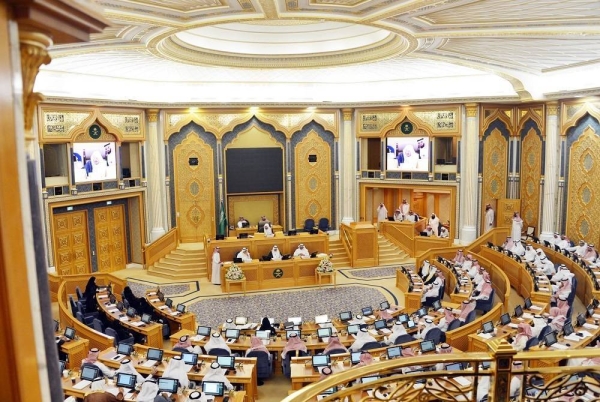
Saudi Arabia’s Shoura Council approved on Monday, by a majority vote, draft amendment to the law of the national flag, emblem and the national anthem but not to their contents.
The proposed changes in the rules governing the green flag, which is emblazoned with a sword and inscribed with Islam’s creed, aim to more clearly define the proper uses of the state emblem, enhance awareness about the importance of the flag and anthem and protect the flag from infringement or neglect.
The amendment was proposed by Shoura member Saad Al-Otaibi in accordance with Article 23 of the law and that was after the amendment had been discussed by the Shoura’s Security and Military Affairs Committee during previous sessions.
The amendment aims to keep pace with the development march being witnessed by the Kingdom as well as to protect the state emblem by specifying penalties for violators in addition to filling the legislative void related to the lack of a regulation for the official national anthem.
The amendment to the Flag Law, which has been in existence for nearly 50 years, aims to keep pace with the reforms and changes being witnessed in Saudi Arabia in recent years, as well as to review and develop regulations and legislative texts that support the goals and initiatives of the Kingdom’s Vision 2030.
It emphasizes the need to address the absence of a system that defines the state anthem and separates the provisions related to it. The move also underscores the need to establish permissions and controls for the use of the state’s emblem in all forums and events, and to specify the penalties to be applied in cases of violation.
The amendment seeks to enhance the level of awareness and knowledge about the importance of the state flag, emblem and national anthem as well as to achieve more protection for the state flag from infringement or neglect. It aims to ensure the consistency of the provisions of the law with the Basic Law of Governance and with the components of Saudi Arabia and its sovereignty, international conventions and norms.
The amendment envisages protection of the state emblem by taking regular measures to hold the person accountable for the infringement or neglect and take punitive measures against him.
It also addresses the societal practices of using the state emblem as a trademark or for commercial purposes or for any purpose other than what is stipulated in the amendment.
There is a provision in the amended law to determine the body authorized by law to control violations, as well as the competent authority to issue rule over them, and the method of submitting grievances or appeal against the verdicts.
The Saudi national flag is a green flag featuring in white an Arabic inscription written in the calligraphic Thuluth script and a sword. The inscription is the Islamic creed or shahada: “There is no god but Allah; Muhammad is the Messenger of Allah.”
The flag is manufactured with identical obverse and reverse sides, to ensure the shahada reads correctly, from right to left, from either side. The sword also points to the left on both sides, in the direction of the script.
The design of the flag was standardized effective from March 15, 1973, when the Saudi Flag Law was issued during the reign of King Faisal. The standardized national flag is rectangular in shape, with its width equal to two-thirds of its length, and its green color extending from the pole to the end of the flag.
The national emblem was adopted in 1950. According to the Saudi Basic Law, it consists of two crossed swords with a palm tree in the space above and between the blades.












